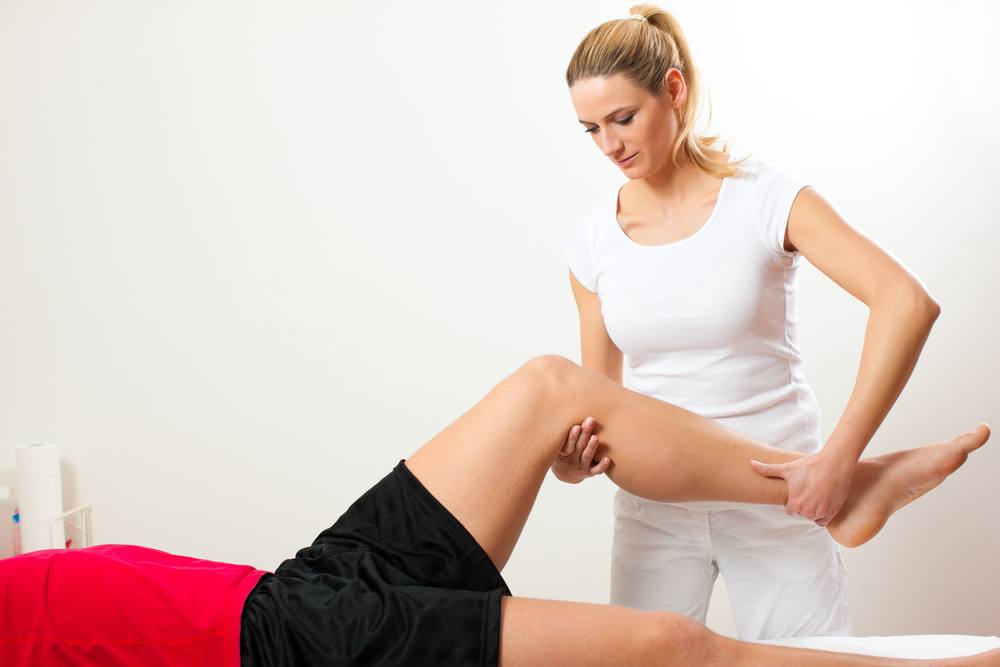 After you’ve been in a car wreck, you may not notice pain or other symptoms of a car accident injury right away. While some mild soreness and discomfort might seem par for the course after a car accident, a “pins and needles” sensation can be a sign of a pinched nerve. A car accident injury can put pressure on a nerve from swelling, inflammation, or damage to tissues, bones, cartilage, or spinal discs. A pinched nerve may not seem like that big of a deal, but it should be taken very seriously. If left untreated, you could end up with serious complications like chronic pain, weakness, and reduced mobility. Check out these signs and symptoms of a pinched nerve to watch out for after a car accident and what to do if you suspect a pinched nerve.
After you’ve been in a car wreck, you may not notice pain or other symptoms of a car accident injury right away. While some mild soreness and discomfort might seem par for the course after a car accident, a “pins and needles” sensation can be a sign of a pinched nerve. A car accident injury can put pressure on a nerve from swelling, inflammation, or damage to tissues, bones, cartilage, or spinal discs. A pinched nerve may not seem like that big of a deal, but it should be taken very seriously. If left untreated, you could end up with serious complications like chronic pain, weakness, and reduced mobility. Check out these signs and symptoms of a pinched nerve to watch out for after a car accident and what to do if you suspect a pinched nerve.
Pinched Nerve: 7 Signs & Symptoms
Here are seven signs and symptoms of a pinched nerve after a car accident.
Radiating Pain
One of the most common signs of a pinched nerve is radiating pain. While some injuries may cause pain right at the site, an injured nerve can send pain that radiates into other parts of the body. For example, a pinched nerve in the neck can cause radiating pain in the shoulder, arm, and hand, while a pinched nerve in the lower back may lead to pain radiating through the buttock, hip, leg, and foot.
Pins & Needles
The “pins and needles” sensation is perhaps best known for that feeling you get when your foot “falls asleep.” Let’s say you were sitting too long with your legs crossed and noticed a painful tingling or prickling feeling when you put weight on your foot. This happens when a nerve that controls your foot becomes aggravated or pinched under the pressure of your crossed legs. As soon as you uncross your legs, the painful sensations go away. However, in the event of a car accident injury, pins and needles might continue if the nerve has become injured or damaged. You may notice the pins and needles sensation gets worse with certain movements.
Numbness
Nerves send signals between the brain and different parts of the body. If a nerve becomes damaged during a car accident or pinched due to an injury, it could lead to numbness in your extremities. This happens because the nerve cannot send signals effectively to your extremities, so you lose sensation in the area altogether.
Skin Sensitivity
A pinched nerve can also make your skin more sensitive, especially above the area where the nerve is located. Your skin may feel sensitive or tender to the touch. You may also experience heightened sensitivity with temperature extremes, like hot and cold temperatures. Things that may not usually bother you can start to cause significant pain and discomfort.
Muscle Weakness
Many nerves control the healthy functioning of muscles and send signals to and from the brain about when and how to move. Damage to a nerve can lead to weakness in the muscles controlled by the affected nerve. For example, a pinched nerve in your lower back could make muscles in your hip and leg feel weak. You might have trouble walking normally or putting too much pressure on the affected leg and foot.
Muscle Spasms
A pinched nerve can also cause muscle spasms or twitching. These uncontrollable movements might feel like a flutter or pulsing in a small muscle or like a painful tightening in larger muscles. The location of muscle spasms will relate to what nerves have been aggravated and what areas of the body they control. Muscle spasms from a pinched nerve are common in extremities like the arms and legs.
Reduced Mobility
Pain, tingling, and weakness in the body caused by a pinched nerve can also lead to reduced mobility. You may start to lose control or function in part of your body. A pinched nerve can make it painful or impossible to complete common movements like bending or twisting. For example, a pinched nerve in your neck can make it difficult to turn your head in certain directions without making your pain and discomfort worse.
Common Causes of a Pinched Nerve
 To relieve the symptoms of a pinched nerve, you will need to treat them at the source. A car accident doctor can diagnose the cause of your pinched nerve and provide you with a comprehensive treatment plan. Here are four examples of car accident injuries that could cause a pinched nerve.
To relieve the symptoms of a pinched nerve, you will need to treat them at the source. A car accident doctor can diagnose the cause of your pinched nerve and provide you with a comprehensive treatment plan. Here are four examples of car accident injuries that could cause a pinched nerve.
Whiplash
The most common car accident injury is whiplash. When the force of impact jolts and jostles your body around, the muscles in your neck can stretch and strain out of their typical range of motion. A whiplash injury refers to muscle strains in the neck caused by the violent forward and backward motion on your head and neck during the accident. The muscles may become inflamed and swollen, which can put pressure on nearby nerves. A whiplash injury can also cause misalignments in the spine, which can compress spinal nerves. A pinched nerve from whiplash can lead to pain, tingling, numbness, and other symptoms that extend into the shoulder, arm, and upper back.
Herniated Disc
A spinal injury that can lead to a pinched nerve is called a herniated disc. Spinal discs provide cushion and separation between vertebrae in the spine. Each spinal disc has a tough outer shell with a soft, jelly-like center that provides shock absorption and allows your spine to move and flex. Damage to one of these spinal discs can cause the tough outer shell to tear or crack. Then the soft insides of the disc may spill out and aggravate or compress a nearby nerve. A pinched nerve from a herniated disc can cause pain and other symptoms that radiate from the spine and into your extremities. Two common places for a herniated disc include the neck, from a whiplash injury, or in the back, leading to a specific type of pain known as sciatica.
Dislocation
A dislocation in one of your joints can aggravate nearby soft tissues like muscles, tendons, ligaments, and even nerves. With over 7 trillion nerves in the human body, many are located around the bones and tissues that make up a joint. A dislocation refers to when one or more bones that make up a joint move or get forced out of place. If you suffer a dislocation from a car accident, it could damage nearby nerves and cause painful symptoms of a pinched nerve. Common dislocations from a car accident include shoulder dislocations, which can make it difficult to move the affected shoulder and arm.
Broken Bone
A broken bone, also known as a fracture, can lead to bone fragments pinching or damaging nearby nerves.
How to Treat a Pinched Nerve
 To diagnose a pinched nerve, your doctor will talk to you about your symptoms and perform a physical examination. They may also have you undergo some tests, including diagnostic imaging tools like an X-ray or CT scan. Other tests to detect a pinched nerve could include blood tests, a nerve conduction study, or a high-resolution ultrasound. Once your doctor has established a diagnosis of a pinched nerve and identified the cause, they can develop a treatment plan that addresses your specific symptoms and targets the source. Here are some examples for how to treat a pinched nerve, depending on the type and severity of the issue.
To diagnose a pinched nerve, your doctor will talk to you about your symptoms and perform a physical examination. They may also have you undergo some tests, including diagnostic imaging tools like an X-ray or CT scan. Other tests to detect a pinched nerve could include blood tests, a nerve conduction study, or a high-resolution ultrasound. Once your doctor has established a diagnosis of a pinched nerve and identified the cause, they can develop a treatment plan that addresses your specific symptoms and targets the source. Here are some examples for how to treat a pinched nerve, depending on the type and severity of the issue.
Home Remedies
For mild pain and discomfort caused by a pinched nerve, you may be able to try these home remedies to experience pain relief. One of the best things you can do for a pinched nerve is to rest the affected area. You may realize that certain movements or activities make your pinched nerve pain and symptoms worse, and taking a break from these motions can help relieve your discomfort. Depending on where the pinched nerve occurs, you may be able to wear a splint or brace to help immobilize the area. For example, if you have a pinched nerve caused by carpal tunnel syndrome, you could wear a wrist brace during the day or at night to help provide better support and restricted mobility while you heal.
Medications
When a pinched nerve is caused by swelling or inflammation in soft tissues, then you may take anti-inflammatory over-the-counter medications like ibuprofen or naproxen sodium to help. Other medications like anticonvulsants may be recommended to treat nerve-related pain. In some cases, your doctor may recommend steroids taken either by mouth or injection to offer longer-lasting pain relief and reduce inflammation. It is important to note that medications do not address the source of the pain but can provide some symptom relief during the treatment process.
Chiropractic Care
Chiropractic care offers a non-invasive and drug-free approach to managing a wide range of health conditions and injuries, including a pinched nerve. You can visit a chiropractor for relief from pinched nerve symptoms like pain, tingling, and numbness. A chiropractor may use chiropractic adjustments to realign your spine and joints if a misalignment is contributing to your pinched nerve symptoms. Chiropractors also work with soft tissues like muscles, ligaments, and tendons, providing treatment techniques like soft tissue mobilization and therapeutic massage to help reduce pain, swelling, and inflammation. For example, your chiropractor can treat a pinched nerve in your neck caused by a whiplash injury. They may perform chiropractic adjustments to realign the spine in your neck to its proper positioning, which helps relieve pressure on nearby nerves. They may also use a hands-on approach to resolving pain, stiffness, and tenderness in your neck caused by the injury.
Physical Therapy
Physical therapy allows you to take an active role in your treatment and recovery from a pinched nerve. A physical therapist will typically incorporate stretches and exercises into your treatment plan that can help relieve pressure on a pinched nerve. By strengthening your nearby muscles and other tissues, the area around your pinched nerve will be able to better distribute the load and engage in proper alignment for longer stretches of time. A pinched nerve can cause symptoms that reduce your mobility and range of motion, and a physical therapist can help. Physical therapy can help you safely and gently restore the range of motion that may have been impacted by a pinched nerve. Through stretches, exercises, and therapeutic massage, your physical therapist can help you start moving with more comfort and confidence again. Your physical therapist can also talk to you about ways to change or modify your activities to help reduce the risk of aggravating the nerve in the future. Physical therapy is also a great place to learn more about how a splint or brace can be worn during certain activities and allow you to grow comfortable with this type of supportive device.
Surgery
In some cases, you may need surgery to help take the pressure off a pinched nerve. Surgery is typically only recommended if your symptoms don’t improve after weeks or months with more conservative treatment approaches. The type of surgery will depend on the location of the pinched nerve and other factors, like what soft tissues may be impacted. For example, one type of surgery to help with a pinched nerve could be a surgical procedure to remove part of a herniated disc in the spine, known as a discectomy.
Visit AICA Orthopedics in College Park to learn about all your options for treating a pinched nerve after a car accident. Our team of car accident doctors includes chiropractors, neurologists, physical therapists, and orthopedic surgeons who specialize in these types of injuries. We work together to provide you with a comprehensive treatment plan that not only addresses your symptoms but also gets at the root of your pain so you can experience lasting relief. Talk to a College Park car accident doctor today about your pinched nerve symptoms and get started on a personalized treatment plan just for you!